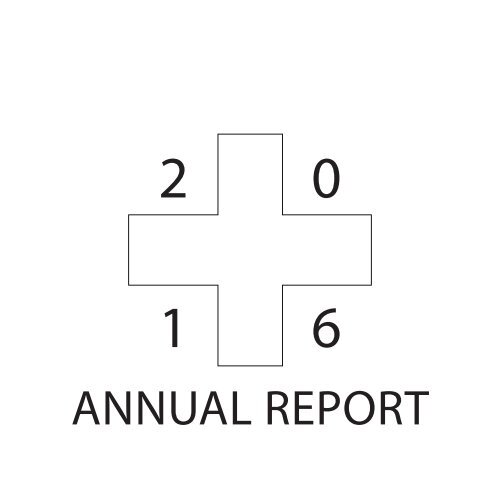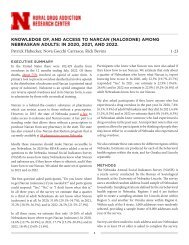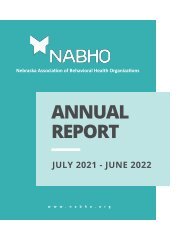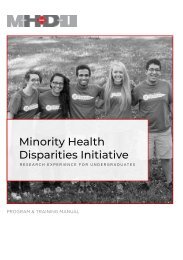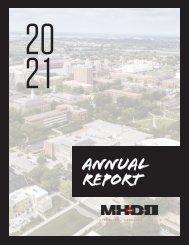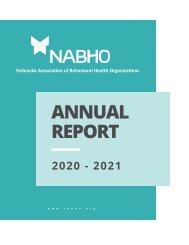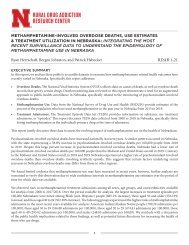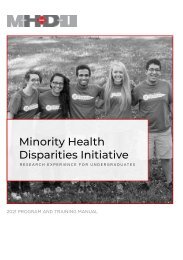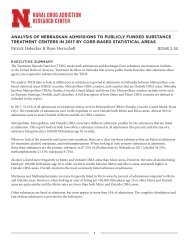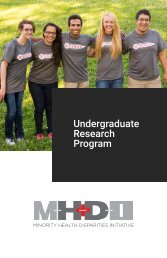Create successful ePaper yourself
Turn your PDF publications into a flip-book with our unique Google optimized e-Paper software.
2 0<br />
1 6<br />
ANNUAL REPORT
Contents<br />
3 6<br />
Message from the Director<br />
The Vision<br />
7<br />
The Team<br />
7 The Leadership Team<br />
9 Advisory Board<br />
10 Core Faculty<br />
11<br />
Community Impact<br />
11 <strong>MHDI</strong> CI Projects<br />
01 <strong>MHDI</strong> <strong>2016</strong>
16<br />
Engagement<br />
16 Conversation Series<br />
16 Visiting Speakers<br />
17 <strong>2016</strong> <strong>Annual</strong> <strong>MHDI</strong><br />
Conference<br />
17 <strong>2016</strong> <strong>Annual</strong> Writers<br />
Retreat<br />
19<br />
Research<br />
19 Faculty Mentoring<br />
19 Research Experience for<br />
Undergraduates<br />
24 McNair Program<br />
Partnership<br />
24 Post-Doctoral Support<br />
25 Grants & Publications<br />
31<br />
Financial <strong>Report</strong><br />
32<br />
Contact<br />
ANNUAL REPORT 02
MESSAGE FROM THE DIRECTOR<br />
The University of Nebraska-Lincoln‘s Minority Health<br />
Disparities Initiative (<strong>MHDI</strong>) has been funded by the UNL<br />
Office of Research & Economic Development since the<br />
summer of 2012. Since 2015, the work of <strong>MHDI</strong> is overseen<br />
by a university advisory board and local stakeholders.<br />
We also draw support from and work closely with<br />
a group of UNL faculty affiliates at the forefront of<br />
research to understand and address health disparities.<br />
This report outlines the progress made during the<br />
fiscal year (FY) <strong>2016</strong> toward our goals of creating<br />
and supporting a community of minority health<br />
scholars and increasing the participation<br />
of minority scholars at all levels of healthrelated<br />
research. To help accomplish this, this<br />
year we added a new staff position to promote<br />
community-based research and community<br />
impact in Nebraska. Working with a wide range of<br />
community stakeholders, this has led to funding<br />
for four new community-based <strong>MHDI</strong> projects<br />
in <strong>2016</strong> alone. For our current faculty affiliates,<br />
<strong>MHDI</strong> submitted over 20 new National Institutes of<br />
Health, Center for Disease Control and Prevention,<br />
and National Science Foundation proposals, and<br />
published over 50 peer reviewed articles. This steady<br />
upward trajectory of research activities represents<br />
one of our most significant accomplishments. In<br />
addition, a number of ongoing efforts aimed at<br />
promoting research were undertaken in FY <strong>2016</strong><br />
including a multi-institutional conference, external<br />
speakers, two intramural community conversation<br />
events on research efforts related to the initiative’s<br />
goals, and a <strong>MHDI</strong> writer’s retreat that produced<br />
a new book on health disparities in the Central Plains.<br />
To enable and support the development of the next<br />
generation of minority health scholars, <strong>MHDI</strong> now<br />
offers an NSF-supported Research Experience for<br />
Undergraduates (REU) Program at UNL. The program<br />
is the only REU in the nation to explore minority health<br />
disparities. The subject matter helped attract some of<br />
the best students in the nation to Lincoln this summer<br />
to work with our outstanding faculty. In addition to the<br />
summer REU, <strong>MHDI</strong> has created an Undergraduate<br />
Research Assistant Program in collaboration with<br />
the McNair Scholars program at UNL which enables<br />
undergraduate students to work directly with <strong>MHDI</strong><br />
faculty affiliates during the academic year on issues<br />
surrounding health disparities. We also supported two<br />
<strong>MHDI</strong> post-doctoral scholars in <strong>2016</strong> to help launch their<br />
own research careers.<br />
Taken together, these efforts and accomplishments<br />
build on our successes of 2015, and pave the way for<br />
greater success in the future. The changes over the last<br />
four years are dramatic. In the report that follows, more<br />
details can be found on where we are now, and where<br />
we are going. For more information, or to get involved in<br />
the Initiative, we invite you to go to mhdi.unl.edu, where<br />
updates, resources, and contact opportunities are<br />
updated frequently. In closing, we thank UNL ORED and<br />
the State of Nebraska for the opportunities to pursue this<br />
important work. Together we are moving to a healthier<br />
and more equitable future.<br />
Kirk Dombrowski<br />
John Bruhn Professor of Sociology, UNL<br />
03 <strong>MHDI</strong> <strong>2016</strong>
“TOGETHER WE ARE MOVING TOWARD A<br />
HEALTHIER AND MORE EQUITABLE FUTURE.”<br />
ANNUAL REPORT 04
“LINKING SCIENCE, POLICY, PRACTICE AND TRAINING TO<br />
IMPROVE THE HEALTH AND WELL BEING OF ALL NEBRASKA<br />
RESIDENTS”
THE VISION<br />
The United States is a diverse nation. Racial and ethnic minorities are the<br />
fastest growing of all communities in the country, and today comprise<br />
approximately 34 percent of the total U.S. population. It is projected that in<br />
less than fifteen years, 40 percent of the population will be non-White. Data<br />
on health status point to the fact that there is significant evidence of poor<br />
health outcomes among racial and ethnic minority populations with respect<br />
to premature death and preventable disease. These poor health outcomes for<br />
racial/ethnic minorities are reflected in the pervasiveness of health disparities<br />
that exist in the United States. Although the health of all Americans has<br />
continued to improve over the last two decades, racial and ethnic health<br />
disparities persist and, in some cases, are increasing. The persistence of<br />
health disparities suggests that the current approaches and strategies are not<br />
producing the kinds of results needed to ensure that all Americans are able to<br />
achieve the same quality and years of healthy life, regardless of race/ethnicity,<br />
gender, and other variables.<br />
The Mission of the Minority Health Disparities Initiative is: “Linking science,<br />
policy, practice and training to better health and well being of all Nebraska<br />
residents” The initiative’s vision is structured such that integrated through each<br />
of our objectives are themes that are vital to the efforts to effectively eliminate<br />
disparities in health through research, education and training, and outreach.<br />
The objectives of the initiative are to identify and strengthen the research<br />
infrastructure, as well as the network of investigators and practitioners<br />
addressing critical health issues to the state and the nation. <strong>MHDI</strong> is<br />
committed to breaking down traditional academic silos, and adopting an<br />
interdisciplinary and translational approach that includes science, policy, and<br />
practice. In doing so, UNL is key to improving the health and well-being of all<br />
Nebraska residents.<br />
ANNUAL REPORT 06
THE TEAM<br />
A diverse group of faculty and community-based agencies have joined together to effectively reduce or<br />
eliminate disparities in health among racial and ethnic minorities in Nebraska and beyond. Funded by<br />
the UNL Office of Research & Economic Development and the Tobacco Settlement Funds, <strong>MHDI</strong> brings<br />
together experts and stakeholders to understand and implement effective strategies for reducing or<br />
eliminating minority health disparities.<br />
<strong>MHDI</strong> formed during the summer 2012 with an external community advisory board. Since 2015, <strong>MHDI</strong> has<br />
been led by Dr. Kirk Dombrowski (Director & John Bruhn Professor of Sociology), coordinated by Kim Gocchi<br />
Carrasco (program of Communications Coordinator), with support from Kim Matthews (Community<br />
Impact and Research Specialist), Mindy Anderson-Knott (Director of Evaluation), and Devan Crawford<br />
(Director of Research Analysis). The work of <strong>MHDI</strong> is overseen by an advisory board of university and<br />
local stakeholders, chaired by the first UNL <strong>MHDI</strong> director, Dr. Rick Bevins, (Willa Cather Professor Chair of<br />
Psychology).<br />
KIRK DOMBROWSKI<br />
Director & John Bruhn<br />
Professor of Sociology<br />
RICK BEVINS<br />
Director & Willa Cather<br />
Professor & Chair of<br />
Psychology<br />
DEVAN CRAWFORD<br />
Director of Research<br />
Analysis<br />
07 <strong>MHDI</strong> <strong>2016</strong>
KIM MATTHEWS<br />
Community Impact &<br />
Research Specialist<br />
KIM GOCCHI CARRASCO<br />
Coordinator<br />
MINDY ANDERSON KNOTT<br />
Director of Evaluation<br />
ANNUAL REPORT 08
ADVISORY BOARD<br />
Our <strong>MHDI</strong> Advisory Board brings together leaders of community organizations, University of Nebraska<br />
faculty, members of Nebraska’s Department of Health and Human services, representatives from UNL’s<br />
administration, and scholars from across the NU system. The board meets tri-annually at UNL to receive<br />
reports from the <strong>MHDI</strong> leadership team.<br />
<strong>2016</strong> COMMUNITY ADVISORY BOARD MEMBERS<br />
Larry Williams<br />
Director of the Malone<br />
Community Center<br />
Steve Goddard<br />
Associate Vice Chancellor<br />
for Research Professor of<br />
Computer Science and Engineering<br />
Roméo Guerra<br />
Executive Director of<br />
El Centro de las Americas<br />
Josie Rodriguez<br />
Director of the Office of Health<br />
Disparities and Health Equity<br />
Laurie Bellows<br />
Director, McNair Scholars Program<br />
Dejun Su<br />
Director of Center for Reducing Health Disparities,<br />
UNMC<br />
Lisa Crockett<br />
Professor of Psychology<br />
Amber Williams<br />
Director of Admissions<br />
University of Nebraska-Lincoln<br />
Sheila Dorsey Vinton<br />
Executive Director<br />
Asian Community and Cultural Center<br />
Arthur Maerlender<br />
Research Associate Professor,<br />
Director of Clinical Research,<br />
Center for Brain, Biology and Behavior
CORE FACULTY<br />
<strong>MHDI</strong> draws support from and works closely with a group of faculty affiliates working to understand and<br />
address health disparities. Our faculty affiliates from Fiscal Year (FY) 2015 include:<br />
Rick Bevins (Psychology)<br />
Jacob Cheadle (Sociology)<br />
Tonia Durden (Child Youth and Family Studies)<br />
Rochelle Dalla (Child Youth and Family Studies)<br />
Bridget Goosby (Sociology)<br />
Tim Nelson (Psychology)<br />
Jordan Soliz (Communication Studies)<br />
Julia Soulakova (Statistics)<br />
Kim Tyler (Sociology)<br />
In FY <strong>2016</strong>, we added a new group of early career faculty whose work will expand and develop research<br />
begun by our current scholars. New faculty affiliates for FY <strong>2016</strong> include:<br />
Virginia Chaidez (Nutrition)<br />
Dipti Dev (Child Youth and Family Studies)<br />
Christopher Gustafson (Agricultural Economics)<br />
Christian King (Nutrition)<br />
Angela Palmer Wackerly (Communication Studies)<br />
Lorey Wheeler (Center for Youth, Family, and Schools)
COMMUNITY IMPACT<br />
In July 2015, the Minority Health Disparities Initiative<br />
launched our Community Impact (<strong>MHDI</strong> CI) mission:<br />
Developing long-term sustainable collaborations<br />
with communities that strengthen efforts to produce<br />
measurable impact on the health disparities affecting<br />
people across Nebraska and the Great Plains. Our<br />
first step was to engage a wide range of community<br />
stakeholders and asked them how we could best serve<br />
them in their efforts to create healthy, growing, and<br />
diverse communities. Together we have developed<br />
innovative CI projects that address the community<br />
identified gaps (See Research). One strategy is working<br />
directly with communities to develop collaborative<br />
research teams. Together we build new and innovative<br />
CI projects that address these identified gaps.<br />
Our rigorous mixed-methods approach combine<br />
social science quantitative research strategies with<br />
community-based models. Another strategy is to<br />
facilitate community relationship building for health<br />
disparities researchers who seek to have a social<br />
impact on the communities that their research serves.<br />
Our statewide effort focuses on three trajectories:<br />
trust, capacity building, and commitment. Building<br />
Community Trust – and directly impacting Nebraska’s<br />
communities of diversity requires “face-time”—a<br />
consistent NU presence that positively impacts people’s<br />
daily lives.<br />
<strong>MHDI</strong> is invested in supporting communities seeking<br />
to build their own capacity to address minority<br />
health disparities. Our robust project portfolio<br />
reflects our commitment to building long-term<br />
working partnerships. Facilitating Inter-institutional<br />
Transdisciplinary Teams and working across disciplines<br />
and institutions presents a wide variety of timeconsuming<br />
challenges.<br />
<strong>MHDI</strong> does the leg work of team building so that our<br />
researchers can stay focused on translating their<br />
expertise into the academic currency that keeps UNL<br />
a world leader in research. We take responsibility for<br />
providing the institutional infrastructures necessary to<br />
collaborate successfully across disciplines, departments,<br />
and campuses. Our work includes comprehensive<br />
project management, faculty mentoring, and grant<br />
development. Current partners come from UNMC<br />
(including outlying campuses), UNO, UNK, and UNL units<br />
from both City and East Campus.<br />
11 <strong>MHDI</strong> <strong>2016</strong>
“DEVELOPING LONG-TERM SUSTAINABLE COLLABORATIONS WITH COMMUNITIES<br />
THAT STRENGTHEN EFFORTS TO PRODUCE MEASURABLE IMPACT ON THE HEALTH<br />
DISPARITIES AFFECTING PEOPLE ACROSS NEBRASKA AND THE GREAT PLAINS.”
<strong>MHDI</strong> CI PROJECTS<br />
YouRhealth<br />
Funded by the Rural Futures Institute, YouRhealth teaches high school<br />
freshman to research, create, implement, and evaluate a wide variety of<br />
public health campaigns. The student-created campaigns are designed to<br />
have a direct impact on the health of their communities, delivered to family/<br />
friends at an end of the semester community health fair.<br />
Health Voice Vision<br />
Funded by Rural Futures Institute, Health Voice Vision is a combined<br />
PhotoVoice and survey research initiative that links community voices/<br />
images with rigorous social science research methods to provide more<br />
insight into the health of rural communities.<br />
ISHealth Network<br />
<strong>MHDI</strong> is spearheading the development of a social indicators measure<br />
of the interrelationships between social determinants of health,<br />
informal community networks, and formal health care delivery systems.<br />
This project is currently funded by the University of Nebraska’s Food<br />
for Health Initiative.<br />
BHECN/<strong>MHDI</strong> Statewide Pilot Project: Cost-Savings of Behavioral Health<br />
Trained Community Health Workers<br />
This project evaluates the short-term cost effectiveness of behavioral health<br />
trained community health workers (CHWs) and will use this evaluation to<br />
predict the potential long-term cost-savings to Managed Care Organizations<br />
(MCOs). This pilot project is currently funded by the University of Nebraska<br />
Medical Center’s BHECN.<br />
13 <strong>MHDI</strong> <strong>2016</strong>
“DIRECTLY IMPACTING NEBRASKA’S COMMUNITIES OF DIVERSITY<br />
REQUIRES INTERPERSONAL ENGAGEMENT – A CONSISTENT NU<br />
PRESENSE THAT POSITIVELY IMPACTS PEOPLE’S DAILY LIVES”
15 <strong>MHDI</strong> <strong>2016</strong>
ENGAGEMENT<br />
A number of ongoing efforts aimed at promoting research were<br />
undertaken in fiscal year <strong>2016</strong> including a multi-institutional conference,<br />
external speakers, two intramural community conversation events on<br />
research efforts related to the initiative’s goals, and an <strong>MHDI</strong> writers<br />
retreat which offered participants the ability to gain new inspiration<br />
on ground-breaking ideas for projects on minority health issues while<br />
simultaneously creating a new book to disseminate to the public.<br />
Conversation Series<br />
Two intramural “conversation” luncheons were held during the year.<br />
These were informal meetings led by UNL researchers who in turn,<br />
provided an overview of ongoing research on topics relevant to a<br />
range of <strong>MHDI</strong> affiliates and led discussion around these topics,<br />
including bringing to light research by other attendees on the same<br />
topics. The latter serves two purposes. The free exchange of research<br />
“in process” can markedly improve the scope and impact of existing<br />
projects. Furthermore, common interests discovered in these events<br />
can lead to future collaborations, as researchers find the delicate<br />
match of complementary skills and common interests.<br />
Visiting Speakers<br />
A number of external speakers were brought to campus to consult<br />
with UNL faculty and to provide a public presentation on a minority<br />
health related topic. All external speakers’ presentations were well<br />
attended with approximately 30-50 attending each presentation.<br />
In September 2015, Ralph DiClemente, Charles Howard Candler<br />
Professor of Public Health and Co-Director of the Center for AIDS<br />
Research (CFAR) Developmental Core at Emory School of Public<br />
Health, presented his talk on prevention programs tailored to African<br />
American adolescents and young adults.<br />
ANNUAL REPORT 16
DiClemente has published extensively in the area<br />
of HIV/STI prevention, particularly among African<br />
American adolescents and young adults.<br />
In March <strong>2016</strong>, Carol Kaufman, Associate Professor in the<br />
Center for American Indian and Alaska Native Health<br />
and the Department of Community and Behavioral<br />
Health, Colorado School of Public Health (CSPH),<br />
presented on her work with American Indians and<br />
Alaska Natives. She is a demographer and sociologist<br />
with major research interests in: (1) The cultural and<br />
community context of adolescent sexual health risks;<br />
(2) the adaptation, implementation, evaluation, and<br />
dissemination of theory based health interventions<br />
within and across diverse communities; and (3) new<br />
applications and approaches in research design and<br />
methodology.<br />
<strong>2016</strong> <strong>Annual</strong> <strong>MHDI</strong> Winter Conference<br />
Each year, <strong>MHDI</strong> sponsors multi-institutional and multiorganizational<br />
events both on campus and in the<br />
communities that we serve. Our <strong>2016</strong> Winter Conference<br />
was held Friday, February 12, <strong>2016</strong> at Embassy Suites<br />
Hotel and Conference Center in La Vista, Nebraska. The<br />
location was selected to facilitate collaboration between<br />
faculty and community partners in Lincoln and Omaha,<br />
Nebraska. Ninety people attended the conference from<br />
across the state and from multiple entities including<br />
twenty different departments, and six state offices<br />
and organizations. Based on our evaluations that were<br />
submitted after the conference ended, 97% of registrants<br />
found the keynote speakers, David Chae, Assistant<br />
Professor of Epidemiology and Biostatistics from the<br />
University of Maryland School of Public Health, and<br />
Amani Nuru-Jeter, Associate Professor of Epidemiology,<br />
Community Health Sciences from Berkeley School<br />
of Public Health, very valuable. Furthermore, 94% of<br />
participants reported that attending the retreat will help<br />
them pursue research funding in minority health.<br />
In the afternoon, participants selected round-table<br />
sessions based on interest and discussed collaborative<br />
issues surrounding the topics and funding opportunities<br />
with the presenter and other participants at the table.<br />
The targeted outcome of the retreat was to facilitate<br />
collaboration, which was met with great success.<br />
Nearly all 49 participants who completed an evaluation<br />
(96%) agreed or strongly agreed that they had found a<br />
researcher or a community partner that they intend to<br />
collaborate with on a project regarding minority health<br />
disparities.<br />
<strong>2016</strong> <strong>Annual</strong> Writers Retreat<br />
A second retreat was held at the Lied Lodge Conference<br />
Center in Nebraska City on May 25-27. The goal of this<br />
retreat was to produce a collection of articles written<br />
by researchers at UNL to help disseminate information<br />
on health disparities in Nebraska to the wider health<br />
community. The audience for the book is a mix of<br />
non-academic local community health researchers<br />
and advocates, school officials, Department of<br />
Health and Human Services, local policy makers,<br />
community advocates, and potentially classroom use<br />
in undergraduate and graduate courses. Activities<br />
included strategic planning, developing the theoretical<br />
framework and direction for the series, a peer review and<br />
extensive group discussion about each of the articles.<br />
Participants included, Christopher Gustafson (Ag Econ),<br />
Angela Palmer-Wackerly (Communication Studies),<br />
Christian King (Nutrition), Elizabeth Straley (Sociology),<br />
17 <strong>MHDI</strong> <strong>2016</strong>
Lorey Wheeler (CYFS), Virginia Chaidez (Nutrition), Jacob Cheadle (Sociology), Kirk Dombrowski (Sociology),<br />
Mindy Anderson-Knott, Cole Boyle, Alian Kasabian, and Trish Wonch Hill (Social & Behavioral Sciences<br />
Consortium), Jordan Soliz (Communication Studies), and Kim Gocchi Carrasco (<strong>MHDI</strong>). The book will appear in<br />
the Fall of <strong>2016</strong> and be circulated widely among Nebraska state officials, DHHS, and interested members of the<br />
Nebraska public health community.<br />
ANNUAL REPORT 18
RESEARCH<br />
To strengthen our infrastructure in the area of minority health<br />
disparities, <strong>MHDI</strong> is focused on submitting publications and grants in<br />
the area. Our leadership team, along with our core faculty members,<br />
submitted over 20 proposals totaling over 11,500,000 dollars. While<br />
the results of many of the applications won’t be known until the next<br />
fiscal year (FY), the steady upward trajectory of research funding and<br />
applications represents one of our most significant accomplishments.<br />
As we look to the future, and to the addition of more core faculty to our<br />
existing team, we feel that the shared resource model, based around a<br />
common interest theme, represents the fastest route to the community<br />
of scholars envisioned by the original <strong>MHDI</strong> Leadership Team.<br />
Faculty Mentoring<br />
<strong>MHDI</strong> has recently implemented a new mentoring program for junior<br />
faculty from across UNL. This program is based on plans developed for<br />
the P20 COBRE application submitted by <strong>MHDI</strong> faculty coordinator Kirk<br />
Dombrowski, and contains detailed processes working in conjunction<br />
with faculty home departments, even while it incorporates the expertise<br />
in minority health found within <strong>MHDI</strong>. In FY 2017, this program will<br />
be implemented and overseen by faculty coordinator Dombrowski<br />
and <strong>MHDI</strong> support staff Devan Crawford. The goal of the mentoring<br />
program is to advance <strong>MHDI</strong> early career faculty to independent<br />
scholar status via professional development and grant instruction.<br />
Research Experience for Undergraduates (REU)<br />
The Minority Health Disparities Initiative (<strong>MHDI</strong>) administers the<br />
Minority Health Disparities Research Experience for Undergraduates<br />
(REU), which is an interdisciplinary program aimed at conducting<br />
cutting edge social and behavioral research into understanding<br />
and reducing health disparities and in diversifying minority health<br />
researchers.<br />
19 <strong>MHDI</strong> <strong>2016</strong>
RESEARCH EXPERIENCE FOR UNDERGRADUATES<br />
This project takes place under support of a Summer<br />
REU grant from the National Science Foundation for<br />
research in social network analysis (SNA) and minority<br />
health. As part of that program, participating mentees/<br />
students learn basic approaches to network science/<br />
SNA in order to employ these skills where possible in their<br />
summer research projects. SNA instruction takes place<br />
during a 2-week intensive class led by Kirk Dombrowski<br />
(Professor of Sociology, UNL), scheduled for the first two<br />
weeks of the program. Training is used to enrich the<br />
students experience in their partner laboratories during<br />
the subsequent 8 weeks. The primary student outcome<br />
of this part of the summer research experience will be<br />
an introductory facility in social network terminology,<br />
visualization, and exploration.<br />
Participating students work with faculty mentors in<br />
a variety of social and behavioral science disciplines<br />
to support health research. All projects are on-going,<br />
but the work specific to the summer research program<br />
will be completed within the 10-week timeframe. At the<br />
conclusion of the program, participants will present<br />
their research at the Summer Research Symposium<br />
poster session. The students, mentors and projects are<br />
highlighted on the following pages.<br />
21 <strong>MHDI</strong> <strong>2016</strong>
LARISSA KMETZ<br />
Professor Virginia Chaidez & Kim Matthews<br />
Nutrition & Health Sciences & Minority Health<br />
Disparities Initiative<br />
Development of a novel Community Health Assessment<br />
Tool<br />
This project involves the development of a community<br />
health assessment tool based on social networking<br />
science. This novel approach will be sensitive enough<br />
to measure the impact of when an intervention,<br />
such as a community health worker, is working at<br />
the intersections between the formal and informal<br />
community health care networks. This is important<br />
because health care access and positive health<br />
behaviors are less likely to occur in those affected<br />
by poverty, such as ethnic minorities, immigrant and<br />
refugee populations, and the aging population.<br />
NATALIE DUBOIS<br />
Professors Bridget Goosby & Jacob Cheadle<br />
Department of Sociology<br />
High Frequency Social Stressors & Biological Markers of<br />
Health in Marginalized Populations<br />
This REU project incorporates dynamic highfrequency<br />
measurement of stressful life experiences<br />
coupled with cutting edge biometric instruments<br />
measuring moment-by-moment stress reactivity. The<br />
purpose of this project is to incorporate innovative<br />
technology with biological markers of stress to<br />
examine how stress gets under the skin to shape<br />
minority health outcomes and risk of stress related<br />
diseases. Students will help analyze data from<br />
both smart phone and wearable devices and may<br />
participate in data collection.<br />
SKKY MARTIN &<br />
MARISSA CARDWELL<br />
Professor Dan Hoyt<br />
Social & Behavioral Science Research Consortium<br />
Support Networks among Homeless and Runaway<br />
Youth<br />
This project examines how turnover and stability in<br />
support networks of homeless youth are related to<br />
risk and resilience over time. The primary focus of<br />
this project is the assessment of how the longitudinal<br />
patterns in support network turnover are related to<br />
risk exposure and pro-social outcomes over time. The<br />
students will also help examine potential variation in<br />
these processes related to the youth’s gender, race,<br />
and sexual orientation.<br />
KATHRYN BOST &<br />
BRANDIE BENTLEY<br />
Professor Jordan Soliz<br />
Communication Studies<br />
Community Dynamics in Racial-Ethnic Identity<br />
The purpose of this project is to investigate<br />
experiences of ethnic-racial minorities in various<br />
domains (e.g., family, friends, community) with an<br />
emphasis on communication processes associated<br />
with well-being and mental health. Working with<br />
Professor Jordan Soliz and advanced graduate<br />
students, the opportunities for these students<br />
include locating and synthesizing literature, learning<br />
about data collection processes, and/or analyzing<br />
qualitative and quantitative data.<br />
ANNUAL REPORT 22
AMANDA NGUYEN, BRANDON CHOW,<br />
& SAMUEL ROSENBLATT<br />
Professor Kirk Dombrowski, Sociology<br />
Network Risk of HIV & HCV Infection in<br />
Rural Puerto Rico<br />
This project investigates the social network contexts<br />
of HIV and HCV infection drawing on data from<br />
four rural communities in Puerto Rico collected<br />
in 2014-15. The emphasis of this project will be on<br />
the use of block modeling and network statistical<br />
analysis to isolate indicators of high risk that result<br />
from dyadic relationships among injectors and the<br />
injection “roles” that result from these interactions.<br />
In the process, the students will help document HIV<br />
and HCV prevalence and incidence for injecting<br />
drug users in the region, which in turn will be used<br />
by the research team to develop a framework for<br />
interventions aimed at these unique problems.<br />
REBECCA VELEZ<br />
Professor Cynthia Willis Esqueda<br />
Psychology and Institute for Ethnic Studies<br />
Unique Social Stressors and Health Outcomes for Latinos<br />
This project addresses underlying connections or<br />
mediators between Latino stress exposure and health<br />
consequences for Latinos. Rebecca Velez will assist to<br />
identify the relationships between stress exposure<br />
(e.g., daily events, discrimination, and employment<br />
disparities), health behaviors (e.g., psychological<br />
dysfunction and coping skills), and mental and<br />
physical health outcomes in Latinos, based on<br />
acculturation and social support. Understanding<br />
these relationships will provide a comprehensive<br />
conceptualization of the pathways leading to health<br />
outcomes of Latinos living in the U.S.<br />
MCNAIR PROGRAM PARTNERSHIP<br />
In addition to the summer REU, <strong>MHDI</strong> has created an Undergraduate Research Assistant Program in collaboration<br />
with the McNair Scholars program at UNL. This programs enables students who “just miss” the McNair financial<br />
qualification cut off to work directly with <strong>MHDI</strong> faculty affiliates and our leadership team on issues surrounding<br />
health disparities. <strong>MHDI</strong> UGRAs utilize and wide combinations of skills to understand and disseminate minority<br />
health disparity information to the UNL community and beyond, and to bring together an audience that could<br />
form the basis of a research community. In addition to work on faculty projects, this has also included an update<br />
of the <strong>MHDI</strong> website, the posting of weekly emailed announcements on <strong>MHDI</strong> related events and news, and the<br />
creation of several successful social media campaigns.<br />
23 <strong>MHDI</strong> <strong>2016</strong>
POST-DOCTORAL SUPPORT<br />
<strong>MHDI</strong> supports a number of advanced researchers at the post-doctoral level. In <strong>2016</strong>, two <strong>MHDI</strong> Post-Docs,<br />
Deadric Williams and Anitra Warrior worked on projects in minority health and health equity that advanced<br />
their own ongoing research, and allowed them to draw on the support and mentorship of UNL faculty. Dr.<br />
Warrior’s post-doctoral focus was the development of a strategic plan and organizational format that would<br />
allow greater health and research collaboration between the Tribal Nations of Nebraska and the University<br />
of Nebraska. The goal was the creation of a future organization that would serve Native Americans through<br />
community initiated projects and help University researchers to address and reduce health disparities in Native<br />
communities.<br />
Dr. Warrior provided outreach and communication with the Tribes and community centers, helping to develop<br />
and deepen relationships between the Tribes and the University. Through a series of meetings, a charter was<br />
formed and the list of participating groups was expanded to include Native American service organizations in<br />
Lincoln, Omaha, and Chadron. The final result of these efforts was the establishment of the Native American<br />
Health and Research Coalition, a Native American-led non-profit board headquartered at the Lincoln<br />
Indian Center. The Board includes members of the Omaha, Ponca, Santee and Winnebago Tribes as well as<br />
representatives from the Lincoln Indian Center, Chadron Native American Center and the Nebraska Urban<br />
Indian Health Coalition. This board will now serve as a leading advocate for addressing Native American<br />
health disparities in the state, and as a conduit for University-based researchers to work with the Native<br />
American community on health related projects.<br />
These scholars also produced scientific publications, grant applications, and conference presentations that<br />
help launch their careers as health researchers. In the process, they further <strong>MHDI</strong> goals of creating a wider<br />
community of UNL health research scholars. Many of our past and present scholars are now transitioning<br />
to full time faculty positions, using the training they received at UNL to further the training of students across<br />
the United States. Here is what some past <strong>MHDI</strong> Post-Docs have accomplished: Tess Neal is an assistant<br />
professor of Social and Behavioral Sciences at Arizona State University, Brandy Clarke is an assistant professor<br />
of Psychology at the Munroe-Meyer Institute, and Deadric Williams will start as an assistant professor of<br />
Sociology at UNL in the fall.<br />
ANNUAL REPORT 24
GRANTS & PUBLICATIONS<br />
SUBMITTED PROPOSALS<br />
Cheadle, J. Khan, B. Risk Take’n N’Stuff, National Institutes of<br />
Health, $275,000.<br />
Submitted 06/16/<strong>2016</strong>.<br />
Cheadle, J. Goosby, B. Operationalizing Stress in Daily Life:<br />
Assessing the Use of Biosignals from Wearable Sensors National<br />
Institutes of Health, $275,000.<br />
Submitted on 06/16/<strong>2016</strong>.<br />
Dalla. R. Using Community-Based Participatory Research to<br />
Reduce Knowledge, Education and Training Gaps: Focused<br />
Attention on FGM/C among Somali Women in the Heartland<br />
DHHS, $332,850.<br />
Submitted on 04/15/<strong>2016</strong>.<br />
Dombrowski, K. Bevins, R., Crawford, D. Dekraai, M. Johnson,<br />
M. Khan, B., Pytlik Zillig, L., Smith, J. Syron, C., Tyler, K., Welch-<br />
Lazoritz, M. The Nebraska Center on Rural Drug Use, National<br />
Institutes of Health, $8,171,308.<br />
Submitted on 01/28/<strong>2016</strong>.<br />
Dombrowski, K. Khan, B. Promoting Community Conversations<br />
about Research to End Native Youth Suicide in Rural Alaska,<br />
National Institutes of Health, subcontract Univ of Massachusetts-<br />
Amherst, $481,167.<br />
Submitted on 4/29/<strong>2016</strong>.<br />
Goosby, B, Cheadle, J. Enhancing Physiological Stress<br />
Measurement Using Wearable Sensors and Smart Devices,<br />
National Institutes of Health, $275,000.<br />
Submitted on 06/16/<strong>2016</strong>.<br />
Goosby, B. Cheadle, J. Nelson, T. One Day at a Time: Using<br />
Wearable Sensors to Measure Stress and Resilience among<br />
Disadvantaged Young Mothers and their Children, National<br />
Institutes of Health, $275,000.<br />
Submitted on 02/16/<strong>2016</strong>.<br />
Goosby, B. Nelson, T. Cheadle, J. Using Mobile Health<br />
Technologies to Monitor and Contextualize Stress, National<br />
Institutes of Health, $275,000.<br />
Submitted on 02/16/<strong>2016</strong>.<br />
Khan, B. Dombrowski, L. Expansion of an Open-Source Mobile<br />
Software Platform for Rural Social, Behavioral, and Health<br />
Research, Rural Futures Institute, $100,000.<br />
Submitted in 05/<strong>2016</strong>.<br />
Syron, C. Safe Injection Kit Development (Supplement to Puerto<br />
Rico Grant #27104), Sappi North America – Ideas that Matter,<br />
$5,000.<br />
Submitted on 7/24/2015.<br />
25 <strong>MHDI</strong> <strong>2016</strong>
CONTRACTS<br />
Anderson-Knott, M. NQIC for Adoption/Guardianship Support<br />
& Preservation: Evaluation Component for Winnebago Tribe of<br />
Nebraska, ACYF Children’s Bureau, $23,969<br />
Anderson-Knott, M. Native Families for Native Children Diligent<br />
Recruitment Project Evaluation, ACYF Children’s Bureau,<br />
$55,997<br />
Anderson-Knott, M. Nebraska State Health Status Assessment,<br />
Nebraska Department of Health and Human Services Division<br />
of Public Health Office of Community Health and Performance<br />
Management, $30,950<br />
Anderson-Knott, M. Minority Health Grant Evaluation Grant<br />
Cycle 2015-17, Nebraska Department of Health and Human<br />
Services Office of Health Disparities and Health Equity, $27,492<br />
Anderson-Knott, M. Chronic Disease 1422 Grant Evaluation,<br />
Nebraska Department of Health and Human Services Division<br />
of Public Health Chronic Disease Prevention and Control,<br />
$72,000<br />
Anderson-Knott, M. Strategic Prevention Framework<br />
Partnerships for Success Evaluation, Nebraska Department<br />
of Health and Human Services Division of Behavioral Health,<br />
$111,719<br />
AWARDED PROPOSALS<br />
Dombrowksi, K. & Khan, B. Measuring Social Behavior via<br />
Dynamic Network Interaction, National Institutes of Health,<br />
$810,875<br />
Whitbeck, L., Crawford, D., & Syron, C.<br />
Indigenous Pathways of Substance Use and Mental Health<br />
through Early Adulthood, National Institutes of Health,<br />
Subcontract from UMD, $101,165<br />
Dombrowski, K. Matthews, K. You Are Rural Health<br />
(YouRhealth), Rural Futures Institute, $19,951<br />
Dombrowski, K. Matthews, K. Supporting of UNMC partnership<br />
with Dr. Shinobu Watanabe-Galloway, Social & Behavioral<br />
Sciences Research Consortium, $5,000<br />
Dombrowski, K. Matthews, K. Toward a Novel Informal Systems<br />
of Community Health Assessment Instrument: Using Network<br />
Science to Better Measure Social Determinants of Health for<br />
Food Related Conditions, Food for Health - NU System Internal<br />
Grant, $19,990<br />
Doctoral Dissertation Research: Cheadle, J. Population<br />
Neuroscience Approaches to Minority Discrimination and<br />
Health, National Science Foundation, $11,997<br />
Williams, D. ‘Couples’ Physiological Synchronicity: Stress,<br />
Health, and Relationship Functioning in Everyday Life, UNL<br />
Center for Brain, Biology and Behavior Seed Grant, $5,000<br />
ANNUAL REPORT 26
<strong>2016</strong> PUBLICATIONS<br />
Barrett, S.T., Geary, T.N., Steiner, A.N., Pudiak, C.M., & Bevins, R.A.<br />
(submitted). Sex differences and the role of dopamine receptors<br />
in the reward-enhancing effects of nicotine and bupropion.<br />
Addiction Biology.<br />
Bevins R.A., & Charntikov, S. (2015). We know very little about<br />
the subjective effects of drugs in females. ACS: Chemical<br />
Neuroscience.<br />
Bright, B. & Soulakova, J.N. (2015). Wald-type testing and<br />
estimation methods for asymmetric comparisons of poisson<br />
rates. Statistics in Biopharmaceutical Research.<br />
Bright, B., & Soulakova, J.N. (In Press). Evaluating the performance<br />
of simultaneous stepwise confidence intervals for the difference<br />
between two poisson rates. Communications in Statistics:<br />
Simulation and Computation.<br />
Charntikov, S., Falco, A.M., Fink, K., Dwoskin, L.P., & Bevins, R.A. (in<br />
revision). Sazetidine-A in combination with other ligands affects<br />
appetitive responding controlled by nicotine: Import of sex.<br />
Charntikov, S., Pittenger, S.T., Thapa, I., Bastola, D.R., Bevins,<br />
R.A., & Pendyala, G. (2015). Ibudilast reverses the decrease<br />
in phosphatidylethanolamine-binding protein 1 induced by<br />
methamphetamine intake. Drug and Alcohol Dependence.<br />
Cheadle, J.E., Walsemann, K., & Goosby, B.J. (2015). Teen alcohol<br />
use and social networks: The contributions of friend’s influence<br />
and selection. Journal of Alcoholism and Drug Dependence.<br />
Colaner, C. W.*, & Soliz, J. (in press). A communication-based<br />
approach to adoptive identity: Theoretical and empirical support.<br />
Communication Research.<br />
Dalla, R. L., & Kennedy, H. R. (2015). “I want to leave—go far<br />
away…I don’t want to get stuck on the reservation”: Examining<br />
developmental trajectories and indicators of well-being among<br />
the adolescent-aged children of Navajo Native American teenage<br />
mothers. Journal of Adolescent Research.<br />
Diamond, J., McQuillan, J., Spiegel, A.N., Hill, P.W., Smith, R., West,<br />
J., & Wood, C. (Submitted). Viruses, vaccines and the public.<br />
Museums & Social Issues.<br />
Falco, A.M., & Bevins, R.A. (2015). Individual differences in the<br />
behavioral effects of nicotine: A review of the preclinical animal<br />
literature. Pharmacology, Biochemistry and Behavior.<br />
Gallois, C., Gasiorek, J., Giles, H., & Soliz, J. (in press)<br />
Communication accommodation theory and its future: Principles<br />
and vistas. In H. Giles (Ed.), Communication accommodation<br />
theory: Conjuring identities. Cambridge: Cambridge University<br />
Press.<br />
Gangi, K., & Soliz, J. (in press). De-dichotomizing intergroup and<br />
interpersonal dynamics: Perspectives on communication, identity,<br />
and relationships. In H. Giles & A. Maass (Eds.), Advances in and<br />
prospects for intergroup communication. New York: Peter Lang.<br />
Gasiorek, J., Giles, H., & Soliz, J. (2015). Accommodating new vistas.<br />
Language and Communication.<br />
Goosby, B.J., Cheadle, J., & McDade, T. (<strong>2016</strong>). Birth weight, BMI,<br />
and body size change over the early life course: Chains of risk to<br />
adult inflammation? Social Science and Medicine.<br />
Goosby, B.J., Cheadle, J.E., & Mitchell, C. (Forthcoming).<br />
Discrimination and racial inequities in health (Biosocial<br />
Mechanisms). <strong>Annual</strong> Review of Sociology.<br />
Goosby, B.J., Cheadle, J.E., Strong, W., & Nelson, T. (Forthcoming).<br />
Discrimination and sleep patterns in parent/child pairs. Journal of<br />
the Social Sciences. Special Issue “Biosocial Pathways of Well-<br />
Being Across the Life Course.”<br />
Goosby, B.J., Malone, S., Richardson, E., Cheadle, J., & Williams,<br />
D.T. (forthcoming). Perceived discrimination and markers of<br />
cardiovascular risk among low-income African American youth.<br />
American Journal of Human Biology.<br />
27 <strong>MHDI</strong> <strong>2016</strong>
Goosby, B.J., Straley, E., & McDade, T. (Forthcoming). Racial<br />
discrimination, allostasis, and sleep: Implications for population<br />
level disparities. Population Research and Policy Review.<br />
Goosby, B.J., Malone, S., Richardson, E., Cheadle, J., & Williams,<br />
D.T. (forthcoming). Perceived discrimination and markers of<br />
cardiovascular risk among low-Income African American youth.<br />
American Journal of Human Biology.<br />
Goosby, B.J., Malone, S., Richardson, E., Cheadle, J.E., & Williams,<br />
D. (2015). Perceived discrimination and markers of cardiovascular<br />
risk among low-Income African American Youth. American<br />
Journal of Human Biology.<br />
Goosby, B.J., Malone, S., Richardson, E., Cheadle, J.E., & Williams,<br />
D. (2015). Perceived discrimination and markers of cardiovascular<br />
risk among low-Income African American youth. American Journal<br />
of Human Biology.<br />
Kaiser, L.L., Chaidez, V., Neelon, M., Algert, S., Horowitz, M.,<br />
Martin, A., Mendoza, C., & Ginsburg, D. (2015). Food resource<br />
management education with SNAP participation improves food<br />
security. Journal of Nutrition Education and Behavior.<br />
Killoren, S. E., Rodríguez De Jesús, S. A., Updegraff, K. A., &<br />
Wheeler, L. A. (2015). Sibling relationship quality and Mexicanorigin<br />
adolescents’ and young adults’ familism values and<br />
adjustment. International Journal of Behavioral Development,<br />
early view.<br />
Killoren, S. E., Wheeler, L. A., Updegraff, K. A., Rodriguez de Jesus,<br />
S. A., & McHale, S. M. (2015). Longitudinal associations among<br />
parental acceptance, familism values, and sibling intimacy in<br />
Mexican-origin Families. Family Process.<br />
King, C. (forthcoming). Food insecurity and housing instability in<br />
vulnerable families. Review of Economics of the Household.<br />
King, C., Markowitz, S., & Ross, H. (2015). Tobacco control policies<br />
and sudden infant death syndrome in developed nations. Health<br />
Economics.<br />
Lin, M.C., Giles, H., & Soliz, J. (in press). Problematic<br />
intergenerational communication and caregiving in the family:<br />
Elder abuse and neglect. In L. N. Olson & M. A. Fine (Eds.),<br />
Examining the darkness of family communication: The harmful,<br />
the morally suspect, and the socially inappropriate. New York:<br />
Peter Lang.<br />
Lundahl, A., & Nelson, T.D. (2015). Sleep and food intake: A<br />
multisystem review of mechanisms in children and adults. Journal<br />
of Health Psychology.<br />
Lundahl, A., Kidwell, K.M., Van Dyk, T.R., & Nelson, T.D. (2015).<br />
A meta-analysis of the effect of experimental sleep restriction<br />
on youth’s attention and hyperactivity. Developmental<br />
Neuropsychology.<br />
Martin-Storey, A., Cheadle, J.E., Skalamera, J., & Crosnoe, R. (2015).<br />
Exploring the social integration of sexual minority youth across<br />
high school contexts. Child Development.<br />
Meendering, J.R., Boeckner, L., Jensen, B., Stluka, S., Kattelmann, K.,<br />
Wey, H., Droke, E., Bowne, M., Fischer, J.A., Wallinga, M., Guzman,<br />
M.D., Anderson-Knott, M., Takahashi, S., Hall, J. (2015). Innovation<br />
and collaboration: Creating a transdisciplinary childhood<br />
obesity prevention graduate certificate program. A Focus on<br />
Sustainability and Expansion. Journal of Nutrition Education and<br />
Behavior.<br />
Nelson, T.D. (2015). Pediatric sleep: Associations with<br />
executive functioning, ADHD, and beyond. Developmental<br />
Neuropsychology.<br />
Nelson, T.D., & Hankey, M. (in press). Evidence-based practice<br />
in pediatric psychology. In M.C. Roberts & R.G. Steele (Eds.),<br />
Handbook of pediatric psychology (5th ed.). New York: Guilford.<br />
ANNUAL REPORT 28
Nelson, T.D., Haugen, K.A., Resetar Volz, J.L., Zhe, E., Axelrod, M.I.,<br />
Filigno, S.S., et al. (2015). Overweight and obesity among youth<br />
entering residential care: Prevalence and correlates. Residential<br />
Treatment for Children & Youth.<br />
Nelson, T.D., Nelson, J.M., Kidwell, K.M., James, T.D., & Espy, K.A.<br />
(2015). Preschool sleep problems and differential associations<br />
with specific aspects of exe-cutive control in elementary school.<br />
Developmental Neuropsychology.<br />
Nicholas, J., Voss, J., Tsuji, J., Fulkerson, N., Soulakova, J. & St Pierre<br />
Schneider, B. (2015). Time course of chemokine expression and<br />
leukocyte infiltration after crush muscle injury in mice. Innate<br />
Immunity.<br />
Nuru, A., & Soliz, J. (2015). Parental socialization of<br />
ethnic identity: Perspectives from multiethnic individuals.<br />
Qualitative Research <strong>Report</strong>s in Communication.<br />
Painter, K., Cleveland, A., Takahashi, S., Fischer, J., Hall, J.,<br />
Jensen, B., Boeckner, L., Anderson-Knott, M., Wallinga, M. (2015)<br />
KidQuest: A nutrition and physical activity program designed for<br />
preadolescent students. Journal of the Academy of Nutrition &<br />
Dietetics.<br />
Perez-Brena, N. J., Wheeler, L. A., Updegraff, K. A., & Schaefer,<br />
D. (2015). Mexican American adolescents’ gender-typed<br />
orientations: The role of sibling and friend characteristics.<br />
Archives of Sexual Behavior.<br />
Pittenger, S.T., Barrett, S.T., Chou, S., & Bevins, R.A. (submitted).<br />
The effects of varenicline on methamphetamine selfadministration<br />
and drug-primed reinstatement in female rats.<br />
Behavioral Brain Research.<br />
Pittenger, S.T., Zeplin, L.C., Dwoskin, L.P., & Bevins, R.A. (in press).<br />
The effect of switching pharmacological intervention during<br />
extinction on nicotine-evoked conditioned responding in rats.<br />
Psychopharmacology.<br />
Schmitz, R.M., & Tyler, K.A. (2015). Homeless young people’s<br />
experiences of caregiver rejection. Journal of Child and Family<br />
Studies.<br />
Simpson, J.L., Grant, K.M., Daly, P., Kelley, S.G., Carlo, G., & Bevins,<br />
R.A. (submitted). Psychological burden in men and women<br />
methamphetamine-dependent patients in treatment. Journal of<br />
Psychoactive Drugs.<br />
Soliz, J. & *Bergquist, G. (in press). Communication<br />
accommodation theory: Quantitative analysis. In H. Giles (Ed.),<br />
Communication accommodation theory: Conjuring identities.<br />
Cambridge: Cambridge University Press.<br />
Soliz, J. (in press). Communication and grandparent-grandchild<br />
relationships. In C. R. Berger & M. E. Roloff (Eds.), International<br />
encyclopedia of interpersonal communication.<br />
Soliz, J. (in press). Divergence and convergence. In C. R. Berger &<br />
M. E. Roloff (Eds.), International encyclopedia of interpersonal<br />
communication.<br />
Soliz, J. (in press). Interethnic communication. In C. R. Berger &<br />
M. E. Roloff (Eds.), International encyclopedia of interpersonal<br />
communication.<br />
Soliz, J., & Fowler, C. (2015). Intergenerational relationships and<br />
the sandwich generation. In J. F. Nussbaum (Ed.), Handbook of<br />
lifespan communication. New York.<br />
Soliz, J., Giles, H., & Gasoriek, J. (2015). Communication<br />
accommodation theory: Innovative contexts and applications.<br />
Language and Communication.<br />
Soliz, J., & Rittenour C. E. (in press). Generativity in the family:<br />
Grandparent-grandchild relationships and the intergenerational<br />
transmission of values and worldviews. In V. Waldron & D. Kelley<br />
(Eds), Developing good relationships: Moral communication<br />
across the lifespan. New York: Peter Lang.<br />
Soulakova, J.N., Bright, B., & Crockett, L.J. (In Press). Perception of<br />
time since smoking cessation: Time in memory can elapse faster.<br />
Journal of Addictive Behaviors: Therapy & Rehabilitation.<br />
Soulakova, J.N., Huang, H., & Crockett, L.J. (In Press). Racial/ethnic<br />
disparities in consistent reporting of smoking-related behaviors.<br />
Journal of Addictive Behaviors: Therapy & Rehabilitation.<br />
29 <strong>MHDI</strong> <strong>2016</strong>
Svingen, L., Dykstra, R.E., Simpson, J.L., Bevins, R.A., Carlo,<br />
G., DiLillo, D., & Grant, K.M. (submitted). Examination of<br />
the associations among family history of substance use,<br />
childhood abuse, and age of first drug use in persons with<br />
methamphetamine dependence. Journal of Addiction<br />
Medicine.<br />
Swalve, N., Barrett, S.T., Bevins, R.A., & Li, M. (2015). Examining<br />
the reward-enhancement effects of phencyclidine and its<br />
interactions with nicotine on lever-pressing for a visual<br />
stimulus. Behavioral Brain Research.<br />
Wheeler, L. A., Updegraff, K. A., & Crouter, A. C. (2015).<br />
Mexican-origin parents’ work conditions and adolescents’<br />
adjustment. Journal of Family Psychology.<br />
Williams, D., Cheadle, J.E., & Goosby, B.J. (2015). Hard times<br />
and heart break: Linking economic hardship and relationship<br />
distress. Journal of Family Issues.<br />
Young, L.B., Grant, K.M., & Tyler, K.A. (2015). Community-level<br />
barriers to recovery for substance dependent rural residents.<br />
Journal of Social Work Practice in the Addictions.<br />
Swalve, N., Pittenger, S.T., Bevins, R.A., & Li, M.<br />
(2015). Phencyclidine transiently attenuates nicotine<br />
selfadministration and potentiates stress-induced<br />
reinstatement in the presence of a visual stimulus.<br />
Psychopharmacology.<br />
Tyler, K.A., & Melander, L.A. (2015). Child abuse, street<br />
victimization, and substance use among homeless young<br />
adults. Youth & Society.<br />
Tyler, K.A., Schmitz, R.M., & Adams, S.A. (2015). Alcohol<br />
expectancy, drinking behavior, and sexual victimization<br />
among female and male college students. Journal of<br />
Interpersonal Violence.<br />
Vierregger, A., J., Hall, J., Sehi, N., Abbott, M., Wobig, K.,<br />
Albrecht, J., Anderson-Knott, M., Koszewski, W. (2015). Growing<br />
healthy kids: A school enrichment nutrition education<br />
program to promote healthy behaviors for children. Journal of<br />
Extension.<br />
Walsemann, K., Goosby, B.J., & Farr, D. (<strong>2016</strong>). Life course SES<br />
and cardiovascular risk: heterogeneity across race and by<br />
gender. Social Science and Medicine.<br />
Wheeler, L. A., Killoren, S. E., Whiteman, S. D., Updegraff,<br />
K. A., McHale, S. M., & Umaña Taylor, A. J. (2015). Romantic<br />
relationship experiences from late adolescence to Young<br />
adulthood: The role of older siblings in Mexican-origin families.<br />
Journal of Youth and Adolescence.<br />
ANNUAL REPORT 30
FINANCIAL REPORT<br />
Funded by the UNL Office of Research & Economic Development and the Tobacco Settlement Funds,<br />
the Minority Health Disparities Initiative was formed in Fall of 2012 with a steering committee that<br />
defined the mission and vision through a series of meetings in one year.<br />
<strong>MHDI</strong> Financial <strong>Report</strong> FY 2015 - <strong>2016</strong><br />
Personnel<br />
Undergraduate Assistant Program $23,357.94<br />
Coordinator $22,158.56<br />
Research Support $50,479.68<br />
Postdoctoral Research $5,099.78<br />
Benefits $19,563.87<br />
Total Personnel $120,659.83<br />
Other Expenses<br />
Infrastructure & Communications $5,520.35<br />
Office & Supplies $8,845.15<br />
Administrative Support $2,173.61<br />
Speaker Series $4,654.97<br />
Conversation Series $1,843.95<br />
Retreats $10,774.85<br />
Travel $16,859.97<br />
Total Other Expenses $50,671.85<br />
Total Expenses $171,331.68<br />
31 <strong>MHDI</strong> <strong>2016</strong>
CONTACT<br />
MINORITY HEALTH DISPARITIES INITIATIVE<br />
University of Nebraska-Lincoln<br />
206 Benton Hall<br />
Lincoln, NE 68588-0623<br />
Tel: 402-472-3205<br />
Fax: 408-263-0119<br />
Email: kdombrowski2@unl.edu<br />
ANNUAL REPORT 32


